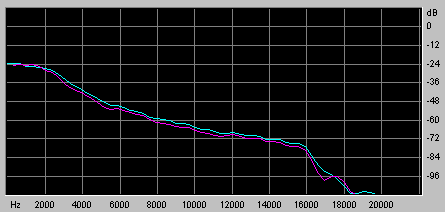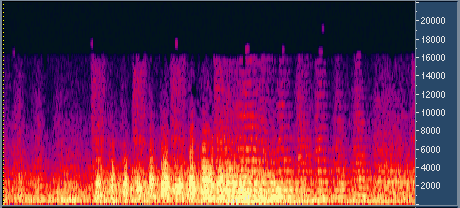
160kb/s HQ MP3 Frequency Response

160kb/s HQ MP3 Spectral View
At 160kb/s the MP3 format is a lot better than 128kb/s.
The frequency response is faithful to the original up to 16kHz .
Above 16kHz the response drops of quite quickly to about 19kHz.
This is a lot better than the very sharp drop off in response of
the 128kb/s file.
Of more importance to me is that the spectral view
reveals nearly all the high frequency content in the 10kHz to 16kHz
range is present. It is this filling in of the finer detail that
makes 160kb/s MP3 far superior to 128kb/s.
Listening tests do not reveal any obvious artifacts.
The valve noise of the trumpet can clearly be heard but it is not
quite as sharp as in the original. The harpsichord is much clearer
than in the 128kb/s MP3 but not quite as crisp as the reference
material. The overall impression is that the music is not quite
the same as the original but it takes very critical listening to
pick up the differences.
I feel that on the average home audio system you would
be hard pressed to hear any difference between a 160kb/s MP3 and
the original CD. It takes a top end audio system or a good pair
of headphones to be able to pick up differences between the MP3
and the CD.
My opinion is that 160kb/s is the best compromise
between compression ratio (at about 10:1) and sound quality. It
is the bit rate that I use for encoding most MP3 files for my personal
use. The sound quality is good enough to satisfy all but the most
discerning audiophiles.
At a CPU usage of about 23% on my system there is
no significant increase in resources needed as compared to a 128kb/s
MP3 file.
[Back] [Next]